#Inefable
Explore tagged Tumblr posts
Text

(Ron Israel)
-Inefable Nostalgia.
#inefable nostalgia#inefable#nostalgia#amor#desamor#frases de amor#notas#notas de amor#notas tristes#amarnxs#amarnos#frases#citas#pensamientos#sentimientos#textos#escritos
5K notes
·
View notes
Text
𝘊𝘳𝘰𝘸𝘭𝘦𝘺 𝘪𝘴 𝘉𝘢𝘳𝘢𝘲𝘪𝘦𝘭 𝘰𝘳 𝘉𝘢𝘳𝘢𝘤𝘩𝘪𝘦𝘭.
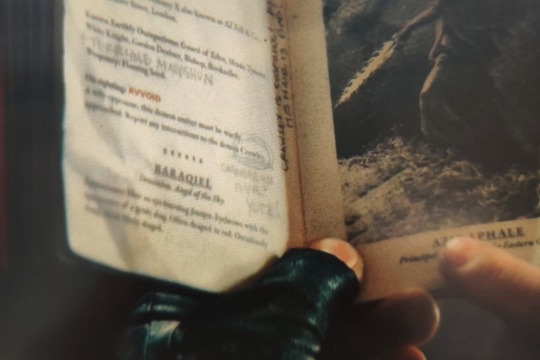

𝘉𝘢𝘳𝘢𝘲𝘪𝘦𝘭 𝘵𝘩𝘦 9𝘵𝘩 𝘸𝘢𝘵𝘤𝘩𝘦𝘳 𝘰𝘧 𝘵𝘩𝘦 20 𝘭𝘦𝘢𝘥𝘦𝘳𝘴 𝘰𝘧 𝘵𝘩𝘦 200 𝘧𝘢𝘭𝘭𝘦𝘯 𝘢𝘯𝘨𝘦𝘭𝘴 𝘵𝘩𝘢𝘵 𝘢𝘳𝘦 𝘮𝘦𝘯𝘵𝘪𝘰𝘯𝘦𝘥 𝘪𝘯 𝘢𝘯 𝘢𝘯𝘤𝘪𝘦𝘯𝘵 𝘸𝘰𝘳𝘬 𝘤𝘢𝘭𝘭𝘦𝘥 𝘵𝘩𝘦 𝘉𝘰𝘰𝘬 𝘰𝘧 𝘌𝘯𝘰𝘤𝘩. 𝘛𝘩𝘦 𝘯𝘢𝘮𝘦 𝘮𝘦𝘢𝘯𝘴 "𝘭𝘪𝘨𝘩𝘵𝘯𝘪𝘯𝘨 𝘰𝘧 𝘎𝘰𝘥", 𝘸𝘩𝘪𝘤𝘩 𝘪𝘴 𝘧𝘪𝘵𝘵𝘪𝘯𝘨 𝘴𝘪𝘯𝘤𝘦 𝘪𝘵 𝘩𝘢𝘴 𝘣𝘦𝘦𝘯 𝘴𝘢𝘪𝘥 𝘵𝘩𝘢𝘵 𝘉𝘢𝘳𝘢𝘲𝘪𝘦𝘭 𝘵𝘢𝘶𝘨𝘩𝘵 𝘮𝘦𝘯 𝘢𝘴𝘵𝘳𝘰𝘭𝘰𝘨𝘺 𝘥𝘶𝘳𝘪𝘯𝘨 𝘵𝘩𝘦 𝘥𝘢𝘺𝘴 𝘰𝘧 𝘑𝘢𝘳𝘦𝘥 𝘰𝘳 𝘠𝘦𝘳𝘦𝘥.

𝘛𝘩𝘦 𝘳𝘪𝘵𝘶𝘢𝘭𝘴 𝘉𝘢𝘳𝘢𝘲𝘪𝘦𝘭 𝘱𝘦𝘳𝘧𝘰𝘳𝘮𝘦𝘥 𝘸𝘦𝘳𝘦 𝘢𝘯 𝘰𝘣𝘫𝘦𝘤𝘵 𝘰𝘧 𝘧𝘢𝘴𝘤𝘪𝘯𝘢𝘵𝘪𝘰𝘯 𝘧𝘰𝘳 𝘣𝘰𝘵𝘩 𝘮𝘦𝘯 𝘢𝘯𝘥 𝘈𝘯𝘨𝘦𝘭𝘴 𝘢𝘭𝘪𝘬𝘦. 𝘏𝘦 𝘣𝘳𝘰𝘶𝘨𝘩𝘵 𝘵𝘰 𝘵𝘩𝘦𝘮 𝘵𝘩𝘦 𝘨𝘪𝘧𝘵 𝘰𝘧 𝘵𝘢𝘮𝘦𝘥 𝘭𝘪𝘨𝘩𝘵𝘯𝘪𝘯𝘨. 𝘋𝘦𝘴𝘱𝘪𝘵𝘦 𝘵𝘩𝘦 𝘸𝘪𝘥𝘦𝘴𝘱𝘳𝘦𝘢𝘥 𝘢𝘱𝘱𝘳𝘦𝘤𝘪𝘢𝘵𝘪𝘰𝘯 𝘧𝘰𝘳 𝘵𝘩𝘦 𝘧𝘳𝘶𝘪𝘵𝘴 𝘰𝘧 𝘵𝘩𝘪𝘴 𝘸𝘰𝘳𝘬, 𝘧𝘦𝘸 𝘷𝘰𝘭𝘶𝘯𝘵𝘦𝘦𝘳𝘦𝘥 𝘵𝘰 𝘢𝘴𝘴𝘪𝘴𝘵. 𝘉𝘢𝘳𝘢𝘲𝘪𝘦𝘭 𝘸𝘢𝘴 𝘬𝘯𝘰𝘸𝘯 𝘯𝘰𝘵 𝘰𝘯𝘭𝘺 𝘧𝘰𝘳 𝘵𝘩𝘦 𝘱𝘰𝘸𝘦𝘳 𝘩𝘦 𝘤𝘰𝘮𝘮𝘢𝘯𝘥𝘦𝘥, 𝘣𝘶𝘵 𝘢𝘭𝘴𝘰 𝘩𝘪𝘴 𝘭𝘢𝘤𝘬 𝘰𝘧 𝘳𝘦𝘴𝘱𝘦𝘤𝘵 𝘧𝘰𝘳 𝘪𝘵. 𝘏𝘪𝘴 𝘧𝘢𝘭𝘭 𝘸𝘢𝘴 𝘵𝘩𝘦 𝘧𝘪𝘳𝘴𝘵 𝘵𝘰 𝘱𝘳𝘰𝘷𝘦 𝘵𝘩𝘢𝘵 𝘞𝘢𝘵𝘤𝘩𝘦𝘳𝘴 𝘸𝘦𝘳𝘦 𝘯𝘰𝘵 𝘤𝘰𝘮𝘱𝘭𝘦𝘵𝘦 𝘪𝘯 𝘵𝘩𝘦𝘪𝘳 𝘸𝘪𝘴𝘥𝘰𝘮 𝘰𝘳 𝘵𝘩𝘦𝘪𝘳 𝘪𝘮𝘮𝘰𝘳𝘵𝘢𝘭𝘪𝘵𝘺.
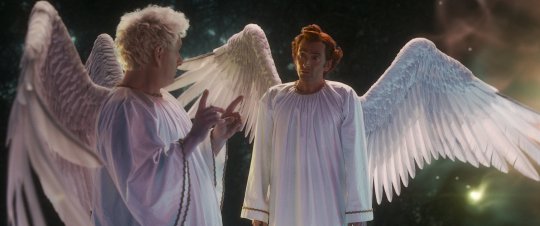
𝘉𝘢𝘳𝘢𝘤𝘩𝘪𝘦𝘭 ("𝘉𝘭𝘦𝘴𝘴𝘦𝘥 𝘣𝘺 𝘎𝘰𝘥"), 𝘪𝘴 𝘰𝘯𝘦 𝘰𝘧 𝘵𝘩𝘦 𝘴𝘦𝘷𝘦𝘯 𝘢𝘳𝘤𝘩𝘢𝘯𝘨𝘦𝘭𝘴 𝘰𝘧 𝘵𝘩𝘦 𝘌𝘢𝘴𝘵𝘦𝘳𝘯 𝘖𝘳𝘵𝘩𝘰𝘥𝘰𝘹 𝘢𝘯𝘥 𝘊𝘢𝘵𝘩𝘰𝘭𝘪𝘤 𝘵𝘳𝘢𝘥𝘪𝘵𝘪𝘰𝘯. 𝘏𝘦 𝘪𝘴 𝘰𝘧𝘵𝘦𝘯 𝘤𝘰𝘯𝘧𝘶𝘴𝘦𝘥 𝘸𝘪𝘵𝘩 𝘵𝘩𝘦 𝘢𝘯𝘨𝘦𝘭 𝘉𝘢𝘳𝘢𝘲𝘪𝘦𝘭, 𝘤𝘰𝘯𝘴𝘪𝘥𝘦𝘳𝘦𝘥 𝘵𝘩𝘦 𝘢𝘯𝘨𝘦𝘭 𝘰𝘧 𝘭𝘪𝘨𝘩𝘵𝘯𝘪𝘯𝘨. 𝘛𝘩𝘦 𝘛𝘩𝘪𝘳𝘥 𝘉𝘰𝘰𝘬 𝘰𝘧 𝘌𝘯𝘰𝘤𝘩 𝘥𝘦𝘴𝘤𝘳𝘪𝘣𝘦𝘴 𝘵𝘩𝘦 𝘈𝘳𝘤𝘩𝘢𝘯𝘨𝘦𝘭 𝘉𝘢𝘳𝘢𝘤𝘩𝘪𝘦𝘭 𝘢𝘴 𝘰𝘯𝘦 𝘰𝘧 𝘵𝘩𝘦 𝘢𝘯𝘨𝘦𝘭𝘴 𝘸𝘩𝘰 𝘴𝘦𝘳𝘷𝘦 𝘢𝘴 𝘨𝘳𝘦𝘢𝘵 𝘢𝘯𝘥 𝘩𝘰𝘯𝘰𝘳𝘦𝘥 𝘢𝘯𝘨𝘦𝘭𝘪𝘤 𝘱𝘳𝘪𝘯𝘤𝘦𝘴 𝘪𝘯 𝘏𝘦𝘢𝘷𝘦𝘯, 𝘢𝘯𝘥 𝘮𝘦𝘯𝘵𝘪𝘰𝘯𝘴 𝘵𝘩𝘢𝘵 𝘉𝘢𝘳𝘢𝘤𝘩𝘪𝘦𝘭 𝘭𝘦𝘢𝘥𝘴 𝘢 𝘩𝘰𝘴𝘵 𝘰𝘧 496,000 𝘢𝘯𝘨𝘦𝘭𝘴. 𝘏𝘦 𝘪𝘴 𝘤𝘰𝘯𝘴𝘪𝘥𝘦𝘳𝘦𝘥 𝘰𝘯𝘦 𝘰𝘧 𝘵𝘩𝘦 𝘴𝘦𝘳𝘢𝘱𝘩𝘪𝘮 𝘸𝘩𝘰 𝘨𝘶𝘢𝘳𝘥 𝘵𝘩𝘦 𝘵𝘩𝘳𝘰𝘯𝘦 𝘰𝘧 𝘎𝘰𝘥, 𝘢𝘴 𝘸𝘦𝘭𝘭 𝘢𝘴 𝘵𝘩𝘦 𝘩𝘦𝘢𝘥 𝘰𝘧 𝘢𝘭𝘭 𝘨𝘶𝘢𝘳𝘥𝘪𝘢𝘯 𝘢𝘯𝘨𝘦𝘭𝘴. 𝘏𝘦 𝘪𝘴 𝘥𝘦𝘴𝘤𝘳𝘪𝘣𝘦𝘥 𝘪𝘯 𝘵𝘩𝘦 𝘓𝘦𝘴𝘴𝘦𝘳 𝘒𝘦𝘺 𝘰𝘧 𝘚𝘰𝘭𝘰𝘮𝘰𝘯 𝘢𝘴 𝘰𝘯𝘦 𝘰𝘧 𝘵𝘩𝘦 𝘢𝘯𝘨𝘦𝘭𝘴 𝘳𝘦𝘴𝘱𝘰𝘯𝘴𝘪𝘣𝘭𝘦 𝘧𝘰𝘳 𝘵𝘩𝘦 𝘧𝘪𝘳𝘴𝘵 𝘢𝘯𝘥 𝘧𝘰𝘶𝘳𝘵𝘩 𝘤𝘩𝘰𝘪𝘳𝘴. 𝘐𝘯 𝘪𝘤𝘰𝘯𝘰𝘨𝘳𝘢𝘱𝘩𝘺 𝘉𝘢𝘳𝘢𝘤𝘩𝘪𝘦𝘭 𝘪𝘴 𝘴𝘰𝘮𝘦𝘵𝘪𝘮𝘦𝘴 𝘥𝘦𝘱𝘪𝘤𝘵𝘦𝘥 𝘩𝘰𝘭𝘥𝘪𝘯𝘨 𝘢 𝘸𝘩𝘪𝘵𝘦 𝘳𝘰𝘴𝘦 𝘢𝘨𝘢𝘪𝘯𝘴𝘵 𝘩𝘪𝘴 𝘤𝘩𝘦𝘴𝘵, 𝘰𝘳 𝘸𝘪𝘵𝘩 𝘳𝘰𝘴𝘦 𝘱𝘦𝘵𝘢𝘭𝘴 𝘴𝘤𝘢𝘵𝘵𝘦𝘳𝘦𝘥 𝘰𝘷𝘦𝘳 𝘩𝘪𝘴 𝘤𝘭𝘰𝘵𝘩𝘦𝘴, 𝘦𝘴𝘱𝘦𝘤𝘪𝘢𝘭𝘭𝘺 𝘩𝘪𝘴 𝘤𝘭𝘰𝘢𝘬. 𝘛𝘩𝘦 𝘴𝘤𝘢𝘵𝘵𝘦𝘳𝘪𝘯𝘨 𝘰𝘧 𝘳𝘰𝘴𝘦 𝘱𝘦𝘵𝘢𝘭𝘴 𝘪𝘴 𝘴𝘶𝘱𝘱𝘰𝘴𝘦𝘥 𝘵𝘰 𝘴𝘺𝘮𝘣𝘰𝘭𝘪𝘻𝘦 𝘰𝘳 𝘳𝘦𝘱𝘳𝘦𝘴𝘦𝘯𝘵 𝘎𝘰𝘥'𝘴 𝘴𝘸𝘦𝘦𝘵 𝘣𝘭𝘦𝘴𝘴𝘪𝘯𝘨𝘴 𝘳𝘢𝘪𝘯𝘪𝘯𝘨 𝘥𝘰𝘸𝘯 𝘰𝘯 𝘱𝘦𝘰𝘱𝘭𝘦. 𝘐𝘯 𝘙𝘰𝘮𝘢𝘯 𝘊𝘢𝘵𝘩𝘰𝘭𝘪𝘤𝘪𝘴𝘮, 𝘉𝘢𝘳𝘢𝘤𝘩𝘪𝘦𝘭 𝘪𝘴 𝘥𝘦𝘱𝘪𝘤𝘵𝘦𝘥 𝘩𝘰𝘭𝘥𝘪𝘯𝘨 𝘢 𝘣𝘳𝘦𝘢𝘥 𝘣𝘢𝘴𝘬𝘦𝘵 𝘰𝘳 𝘴𝘵𝘢𝘧𝘧, 𝘣𝘰𝘵𝘩 𝘰𝘧 𝘸𝘩𝘪𝘤𝘩 𝘴𝘺𝘮𝘣𝘰𝘭𝘪𝘻𝘦 𝘵𝘩𝘦 𝘣𝘭𝘦𝘴𝘴𝘪𝘯𝘨𝘴 𝘰𝘧 𝘤𝘩𝘪𝘭𝘥𝘳𝘦𝘯 𝘵𝘩𝘢𝘵 𝘎𝘰𝘥 𝘣𝘦𝘴𝘵𝘰𝘸𝘴 𝘰𝘯 𝘱𝘢𝘳𝘦𝘯𝘵𝘴.

𝘖𝘯𝘦 𝘰𝘧 𝘵𝘩𝘦 𝘛𝘩𝘳𝘰𝘯𝘦𝘴, 𝘢 𝘥𝘪𝘳𝘦𝘤𝘵 𝘴𝘱𝘢𝘳𝘬 𝘰𝘧 𝘎𝘰𝘥'𝘴 𝘰𝘯𝘭𝘺𝘊𝘳𝘦𝘢𝘵𝘰𝘳 𝘚𝘰𝘶𝘳𝘤𝘦 𝘛𝘩𝘳𝘰𝘯𝘦𝘴, 𝘢𝘴 𝘵𝘩𝘦 𝘯𝘢𝘮𝘦 𝘪𝘮𝘱𝘭𝘪𝘦𝘴, 𝘤𝘢𝘳𝘳𝘪𝘦𝘴 𝘵𝘩𝘦 𝘛𝘩𝘳𝘰𝘯𝘦 𝘰𝘧 𝘎𝘰𝘥 ����𝘣𝘰𝘷𝘦 𝘢𝘯𝘺𝘵𝘩𝘪𝘯𝘨 𝘢𝘯𝘥 𝘦𝘷𝘦𝘳𝘺𝘵𝘩𝘪𝘯𝘨.
#good omens#digital art#good omemes#drawing#good omens 2#good omens fanwork#artwork#artists on tumblr#go season 2#animation#good omens cast#crowly x aziraphale#crowley x aziraphale#crowley#good omens theory#go2 spoilers#spoiler#spoiler good omens#ineffable husbands#ineffable partners#inefable#ineffable idiots#good omens fanart#good omens spoiler#go2#good omens poster#theory#go2 trailer#angel#neil gaiman
587 notes
·
View notes
Text
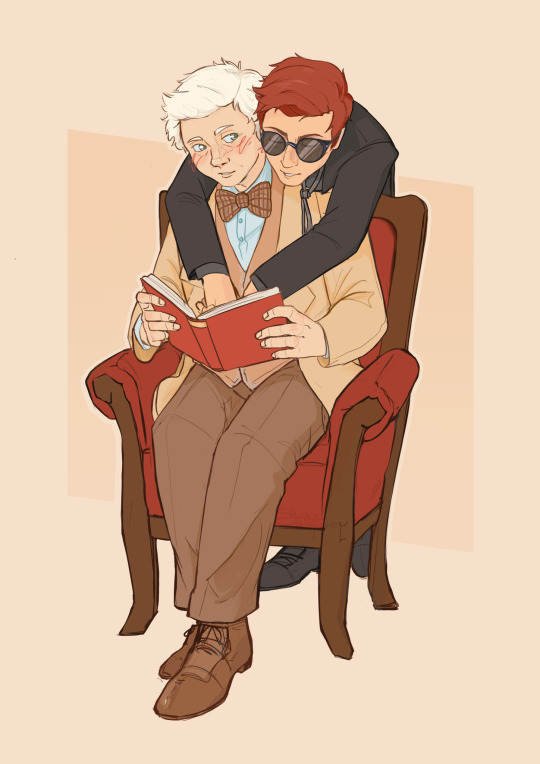
TIME TOGETHER (。・ω・。)ノ♡
#good omens fanart#good omens#good omens 2#aziracrow#aziraphale#crowley#neil gaiman#inefable#ineffable#ineffable husbands
183 notes
·
View notes
Text

I have to be close to you to breathe
#neil gaiman#aziraphale#good omens#michael sheen#art#Go2#go2 fanart#go2 spoilers#Crowley#crowley x arizaphale#crowley fanart#Aziraphale#aziraphale good omens#inefable#inefabble husbands#aziraphale fanart#fanart#david tennant#amazon prime
445 notes
·
View notes
Text
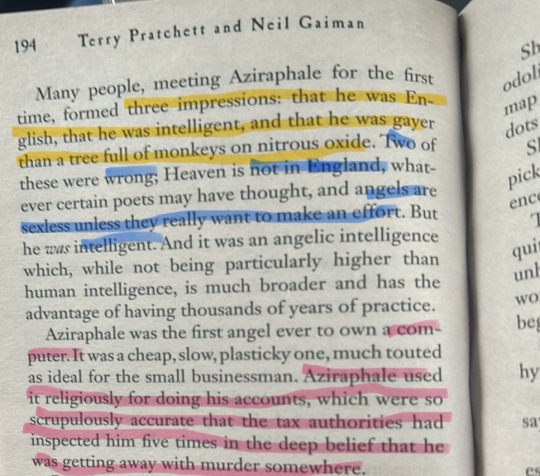
I love this book!
Book Aziraphale is even sassier then the show version!
Oh and I am certain he makes people disappear, not related to this snippet though!
#good omens#aziraphale#good omens book#book aziraphale#inefable#inefabble husbands#Gay#angels#sassy#aziraphale has skeletons in his closet#book omens#bookblr#lgbtqia#gender
102 notes
·
View notes
Text
Y ahora que te tengo no te voy a soltar nunca jamás.
Cautela
#citas#notas#géminis#escritos#frases#inefable#textos#caostalgia#escritor tumblr#en tu orbita#pensamientos#amor#marzo 2023#cautela#invisible
471 notes
·
View notes
Text

One word: AAAAAAAAAAAAAAAAAAAAAAAAAAAAAAAAAAA-
It's not a word, but I don't give a shit. HDHGSDHSGD
#sam & max#freelance husbands#sam & max fanart#max sam and max#sam & max freelance police#sam sam and max#good omens fanart#good omens#good omens season 2#inefabble husbands#fanart#inefable#aziracrow#anthony j crowley#aziraphale
248 notes
·
View notes
Text
“No sabemos lo que pasará, pero si lo que queremos que pase”
Cautela
#notas#escritos#géminis#citas#frases#inefable#extraviadxs#textos#escritor tumblr#en tu orbita#amor#pensamientos#melancolirio#fragmentos#marzo 2023#cautela#invisible
280 notes
·
View notes
Text
Una verdadera amistad es como una estrella, brilla con luz propia, incluso en la oscuridad, y su calor permanece en el corazón, incluso cuando la distancia nos separa.
#Una verdadera amistad es como una estrella#brilla con luz propia#incluso en la oscuridad#y su calor permanece en el corazón#incluso#amistad#distancia#un escritor dice#citas de la vida#amigo#amiga#amigos#amigas#cariño#citas#frase#cita#citas en imagenes#inefable#frases#frases de la vida#text post#my text#text#texto en tumblr#txt post#textos#citas en tumblr#citas en español#noche
20 notes
·
View notes
Text

(Anónimo)
-Inefable Nostalgia.
#inefable nostalgia#inefable#nostalgia#amarnxs#amor#desamor#frases de amor#notas#notas de amor#notas tristes#amarnos#escritos#frases#citas#pensamientos#sentimientos#textos
4K notes
·
View notes
Text
Good and Evil in “Good Omens”: A Theological Reflection on Aziraphale and Crowley ⸻⸻⸻⸻⸻⸻⸻⸻
In the world of Good Omens, the eternal debate between good and evil is explored in unexpected and profound ways. The series, based on the novel by Neil Gaiman and Terry Pratchett, offers a theological reflection that challenges traditional concepts of divine justice, revealing how the boundaries between good and evil are not always so clearly defined.

Aziraphale and Crowley: The Unlikely Pair of Good and Evil
Aziraphale and Crowley are emblematic characters who represent good and evil, respectively. Aziraphale, the angel, is often seen as a guardian of divine rules, but his tendency to deviate from celestial norms reveals an unexpected complexity. Despite his role as a bearer of goodness, he often questions divine decisions and acts according to his own judgment. For instance, his act of giving the flaming sword to Adam and Eve is initially seen by him as a potentially wrong choice, although Crowley reassures him that, as an angel, Aziraphale cannot truly do anything wrong. This resonates with James 1:17: "Every good and perfect gift is from above, coming down from the Father of the heavenly lights, who does not change like shifting shadows."
Crowley, the demon, is also a surprising character. Although he represents Hell, his actions and motivations demonstrate that even a demon can have positive intentions. Crowley reflects on the issue of temptation and worries whether, by tempting Adam and Eve, he acted correctly. His reflection raises questions about the role of the demon in causing trouble or doing good, and suggests that even when a demon seems to act with good intentions, it can create chaos in unexpected ways. Romans 8:28 states: "And we know that in all things God works for the good of those who love him, who have been called according to his purpose." This verse suggests that even in the most controversial actions, there may be a divine plan guiding towards good.

The Ineffable Plan of God
The concept of the Ineffable Plan in “Good Omens” is central to the plot and theological reflection. This plan, which transcends human understanding, implies that every action, whether good or bad, fits into a larger, incomprehensible divine design. The Bible itself mentions the ineffability of the divine plan in Isaiah 55:8-9: “For my thoughts are not your thoughts, neither are your ways my ways, declares the Lord. As the heavens are higher than the earth, so are my ways higher than your ways and my thoughts than your thoughts.” This passage underscores that human understanding is limited compared to the divine plan.

The Act of Giving and Tempting One of the main concerns of the characters is whether their actions align with the divine plan. Aziraphale, worried about giving the flaming sword to Adam and Eve, reflects on whether he acted correctly. His concern is eased by Crowley, who reassures him that, as an angel, Aziraphale cannot do anything truly wrong. This reflects the idea that angels, as messengers and servants of God, always act in accordance with divine will, as highlighted in Psalm 103:20: “Praise the Lord, you his angels, you mighty ones who do his bidding, who obey his word.”
Crowley, on the other hand, is troubled by whether his role as tempter may have had positive or negative effects. He wonders if it is possible that, even if a demon does something right, it could still create disastrous consequences. This theme is explored in 1 Corinthians 10:13: “No temptation has overtaken you except what is common to mankind. And God is faithful; he will not let you be tempted beyond what you can bear. But when you are tempted, he will also provide a way out so that you can endure it.” This verse suggests that even in situations of temptation, God provides a way out and guides towards salvation.

The Question of “What is Right and Wrong”
Crowley raises fundamental questions about the concept of divine justice and understanding what is right and wrong. In the series, his reflection poses a crucial question: if a person is punished for a mistake, why not instead guide them to understand where they went wrong? This reflection raises deep questions about the nature of divine justice. If punishment is the only response to errors, then the process of learning and moral growth is sacrificed. Crowley suggests that understanding and guidance are more effective than mere punishment, and that true moral progress comes from awareness and improvement rather than simple sanction. Proverbs 3:12 says: “Because the Lord disciplines those he loves, as a father the son he delights in.” This verse highlights that correction and teaching are tools through which God guides and disciplines, rather than mere punishment.

Conclusion: Beyond the Dichotomy of Good and Evil
“Good Omens” invites us to reflect on how categories of good and evil may be more nuanced than they appear. The complexity of Aziraphale and Crowley’s characters, and the concept of the Ineffable Plan, show us that morality is often a gray area rather than a clear-cut boundary. Actions that seem wrong or evil may ultimately serve a higher good, and decisions that appear right can have unexpected consequences.
The series challenges us to reconsider our ideas about justice and redemption, suggesting that true good and true evil are not always what they seem and that a deeper understanding of the divine may reveal a grander and more complex design than we can imagine. Ultimately, good and evil might be more interconnected than we believe, and actions that seem immoral or wrong could, in the grand scheme of things, serve purposes that transcend our immediate understanding.
#good omens#good omens 2#analyses#theory#crowly x aziraphale#crowley#good omens spoiler#aziracrow#aziraphale#good omens theory#good omens crowley#azicrow#evil#good and bad#good and evil#crowley x aziraphale#ineffable husbands#inefabble husbands#inefable
21 notes
·
View notes
Text
A mini Good Omens comic to pass the sadness ;w;
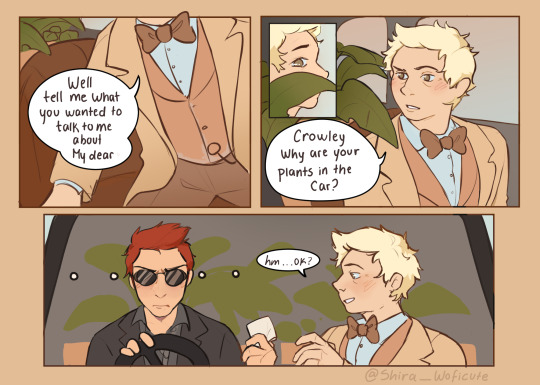


187 notes
·
View notes
Text
the way every Queen song can be so aziracrow, but I Was Born to Love You is too much, it's literally Freddy writing Crowley's feelings
#good omens#aziraphale#crowley#aziracrow#crowly x aziraphale#queen#i was born to love you#song#aziracrow song#inefabble husbands#inefable#ineffable idiots#freddy
28 notes
·
View notes
Text


Tell me where you are and I will come to you wherever you are
Crowley season 1 episode 5
#aziraphale#crowley#good omens#michael sheen#neil gaiman#fanart#go2#go2 spoilers#art#good omens fanart#crowley x aziraphale#aziraphale x crowley#azicrow#inefabble husbands#inefable
83 notes
·
View notes
Text
Pienso si habrá algo más hermoso en el mundo que no sea tu hermosa sonrisa.
Cautela
#citas#notas#caostalgia#escritos#frases#pensamientos#textos#en tu orbita#amor#citas en español#géminis#español#inefable#marzo 2023#escritor tumblr#cautela#invisible
319 notes
·
View notes
Text



Finally done. My painting after three weeks is done. I caled it:
-Angel from Eastern gate and snake
#art#aziraphale#crowley#good ineffable omens#good omens#inefable#ineffable idiots#nature#photography
21 notes
·
View notes